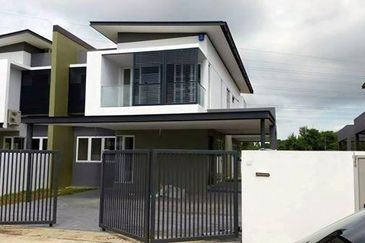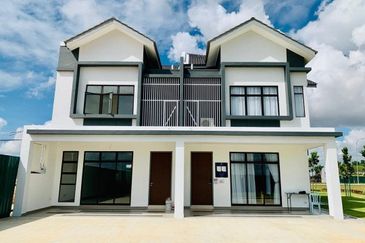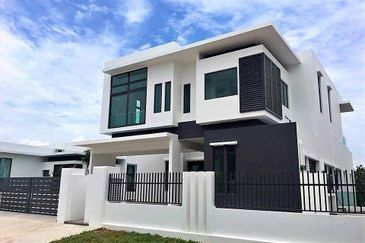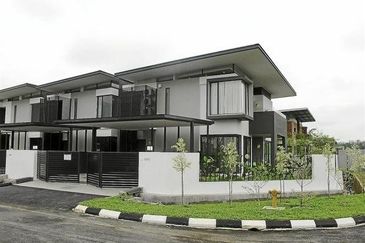IMPROVING sales and a liquid offshore capital market have pulled China's property developers back from the brink of collapse. However, they are still not out of the woods yet as policy is expected to remain tight, with no change in sight until after 1Q2013, says Christopher Lee, a corporate credit rating analyst at Standard & Poor's.
In a recent interview with The Edge Singapore in Singapore, Lee says he is not expecting any directional change in policy in the short term as inflation remains a concern. "What the government wants is for prices to remain stable and the social housing programme to make some headway. It wants to build 36 million units by 2015 and it started [doing that] in 2011, so the next few years will be crucial. Until then, there is limited space for policy to be relaxed," says Lee.
The leadership change is another factor that will put policy changes on hold, at least until the transition is over. "The new leadership won't make its mark until 2Q2013," Lee says.
Things looked pretty bleak for China's property developers early this year. As credit tightened, many of them began trying to sell assets and raise fresh equity to stay afloat. Notably, Greentown China sold a 24.6 % stake in itself to Wharf Holdings in June, after selling land-use rights to a 25,594 sq m plot in Shanghai to Soho China in April. Coastal Greenland sold land-use rights to a 115,700 sq m commercial project in Suzhou to Shenzhen Investment and SPG Land sold land-use rights to a 263,300 sq m piece of land in Wuxi to Evergrande Real Estate Group.
Fortunately, China cut interest rates in June and gave banks more flexibility to set deposit and lending rates. A second rate cut followed in July. That set the stage for a sharp rebound in the property market. A Nov 5 Citi Research report says that in October, major developers averaged property sales growth of 3% m-o-m and 35% y-o-y. "The worst for developers is over in terms of liquidity. They were distressed, but didn't go under. Just as they were on the brink, the property market rebounded from the bottom," says Lee.
Yet, profit margins of property developers are still under some pressure, reflecting competitive price cuts in order to boost sales. So far, the heavyweight players such as China Overseas Land Investment (COLI), China Resources Land (CR Land) and Shimao Properties have been relatively less affected, as they were able to maintain their sales without significant price cuts. But Lee says it's a matter of time before they, too, will be hit. "All their margins are going to come down. The question is how much the margin drop will be offset by an increase in sales," says Lee.
The big developers might still have an edge over their smaller peers in the months ahead, though, because of their superior credit ratings, which enable them to obtain financing on relatively favourable terms to expand their landbank. On the other hand, the smaller players are not only suffering a sharper contraction in margins but are also less likely to be able to obtain credit on the same favourable terms for growth. "For the vast majority in the lowly rated category B or BB-, sales have not caught up. It's a double whammy for them," says Lee.
Tapping offshore funds
With improved sales in 2H2012, the major developers have been in better shape to raise bond financing. Among the developers that have done so are Kaisa Group Holdings, Fantasia Holdings Group, Longfor Properties, Franshion Properties, China South City Holdings and Soho China. Collectively, they have raised more than US$4.2 billion (S$5.1 billion) in bond proceeds since July compared with just two deals that total less than US$1.1 billion in 1H2012.
In fact, yields on their bonds have compressed recently, reflecting strong investor appetite for their paper. Longfor, which is rated BB+, was giving a yield of 9% two years ago compared with below 7% in September. Franshion gave a yield of only 4.7% on its US$500 million bond in October, reflecting its parentage. It is a unit of the state-owned Sinochem Corp. A year or two ago, such low yields would only have been accorded to investment-grade bonds. Yet, Franshion is rated only BB+.
However, while the market has become generally more enthusiastic about debt issues from Chinese property developers, it is still discriminating between the creditworthiness of the issuers. For weaker developers, the yield on their debt paper can be as high as 13% to 14%. "There is a lot of liquidity, but the market is also rational looking at how they price the yield," says Lee.
The result of this is that larger players with access to cheaper credit might pull further ahead of their smaller peers. "Every cycle, we see the small developers getting smaller and the big ones getting bigger," Lee says. Among the companies that have managed to parlay superior access to credit into greater heft is COLI, according to Lee. "COLI's sales were only RMB10 billion in 2006. Today, they are RMB100 billion (S$19.55 billion)," he says.
In fact, among the big developers, COLI has been the most consistent in terms of performance, according to S&P. It has earned a BBB rating — the highest of the ratings and is the most consistent in terms of growth in sales and landbank, growing at 20 to 25% year in, year out.
With the unequal access to credit, it seems unlikely that many more Chinese developers will succeed in expanding across the whole nation. Indeed, some national-scale developers could well drop out of this rarified group if they make a mistake that causes investors to stay away from their bonds. Shanghai-listed Poly Real Estate Group and China Vanke and Hong Kong-listed COLI, Evergrande and CR Land will likely remain national scale if they do not do anything reckless, according to Lee.
Of these, Evergrande is seen to have a bigger risk appetite, with more aggressive land acquisition and growth strategies. "The bigger risk appetite is a weakness that affects its credit rating," says Lee.
More niche players
That's not to say that all the smaller players will fade into oblivion. The way Lee sees it, as the market becomes more polarised, some developers will become specialists in certain markets and geographical regions. Or, they might choose to specialise in investment properties. That might enable them to draw debt from investors looking for exposure to a certain niche area.
Among the companies that seem to be headed in that direction is Beijing-based Soho China, which is evolving a develop-and-hold model that could make it one of the first property investment companies in China. Then, there is Mainboard-listed Yanlord Land Group, which builds luxury homes, many of which are in Shanghai.
Niche players face their own challenges, though. Lee points out that Yanlord was more badly affected than mass-market players such as Country Garden and Evergrande by home purchase restrictions that limit people from buying more than two properties. The mass-market developers have diversified projects, low price points and a broader customer base, which provide them with more stable earnings and cash flows. On the other hand, Yanlord's narrow focus on upmarket projects means that many of its potential customers already have more than two homes.
"Yanlord didn't want to cut prices because of its brand, so it was forced into a corner. Even if they cut prices, they may not be able to sell," says Lee. "But they are still in the game. They have very good products. They are very reputable. They have good execution and some high-quality investment properties." The company has a BB- credit rating.
Yanlord has actually seen its sales improve recently, and it managed to repay its convertible bondholders in July. Now, some analysts think it might benefit from impending changes to the home purchase restriction policy. They say the policy was a stopgap measure and that a property tax will soon replace it.
"It could be a tax on the value of property, based on market valuation, and that applies to new properties only," says Lee. "[That could] replace home purchase restrictions, which create a lot of distortion to the whole system. Something that is more efficient and easy to implement will be introduced. It will also expand the tax base." Shares in Yanlord are up 33% this year and are currently trading at 11.6 times forward earnings.
While it could be some time before China's property developers see their earnings rebound to their 2011 levels, the improved — though still unequal — access to credit is making the outlook for the sector less uncertain.
This story first appeared in The Edge Singapore weekly edition of Nov 12-18, 2012.
TOP PICKS BY EDGEPROP

R&F Princess Cove, Tanjung Puteri
Johor Bahru, Johor

Puteri Cove Residences
Iskandar Puteri (Nusajaya), Johor

Avira Garden Terraces @ Medini
Iskandar Puteri (Nusajaya), Johor






















